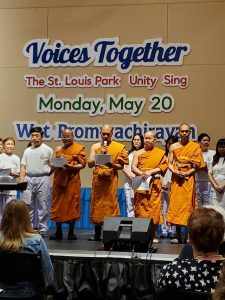Diversity/Unity – A Weekly Letter From Rabbi Davis – May 24, 2019
Shalom Chaverim
Earlier this week, I had the privilege of attending Unity Sings at the Wat Thai Temple across Highway 100. Organized by the St Louis Park arts council, it brought together choirs from Beth El, Westwood Lutheran Church, students from Benilde St Margaret’s and the monks from the Temple. Each group presented songs, spoke about music in their tradition, and then we all sang together. The musical styles and languages were all different, but singing together did indeed bring us closer. It was an evening of beautiful music and building friendships.
 Later in the week, I attended a program at the St Louis Park High School. I was impressed as the principal read names of students that reflected the diversity of the student body. There were names that were Arabic, Hebrew, Spanish, Somali, Nordic, etc. Tom Friedman likes to joke, “If Finland and Israel had a baby, it would be St. Louis Park.” But really SLP is increasingly more diverse than that. And if these events were any indication, the population embraces its diversity.
Later in the week, I attended a program at the St Louis Park High School. I was impressed as the principal read names of students that reflected the diversity of the student body. There were names that were Arabic, Hebrew, Spanish, Somali, Nordic, etc. Tom Friedman likes to joke, “If Finland and Israel had a baby, it would be St. Louis Park.” But really SLP is increasingly more diverse than that. And if these events were any indication, the population embraces its diversity.
I mentioned last week the new UN report about the drastic decline in biodiversity because of climate change and the need to guard and protect species. Increasingly scientists understand that every species offers something needed and special for the overall health of the environment.
Already 1800 years ago, the rabbis recognized this basic truth had been woven into the fabric of creation. In a midrash on Genesis we read, “Even things you see as superfluous in this world like flies, fleas and mosquitoes, they are part of the greater scheme of the creation of the world, as it says (Gen. 1:31): “And God saw all that God had created, and behold it was very good…” They are part of the greater scheme of the creation of the world” (Gen. Rab. 10:7).
What is true in nature is true in society as well. As Rabbi Sacks writes, “Cultural diversity is as essential to our social ecology as biodiversity is to our natural ecology.” Different languages, religions, songs, etc. are part of the world’s cultural richness. Each adds something unique to the collective heritage of humankind. And yet they too are threatened. They are threatened by economic globalization which frequently homogenize and erase difference. And they are threatened by apathy and assimilation. When people do not treasure their unique gifts enough to preserve them, we are all impoverished. As Sacks writes, “it is only by being what we uniquely are that we contribute to humankind what we alone can give.”
Even as we seek to preserve the earth’s biodiversity, let us enrich its cultural diversity by preserving what is uniquely ours- Judaism.
Bivrakha,
Rabbi Alexander Davis
adavis@bethelsynagogue.org
